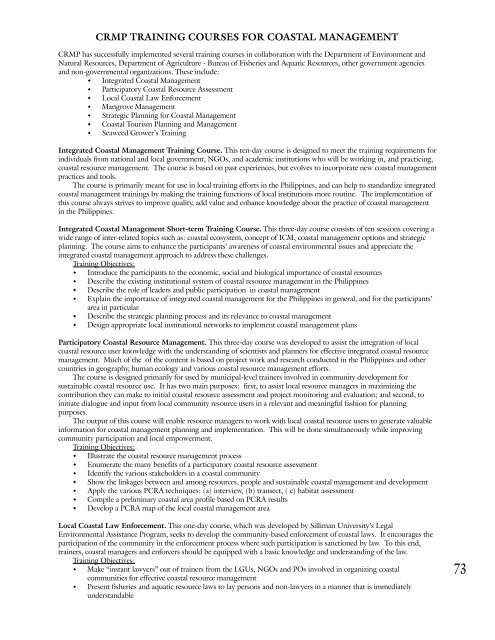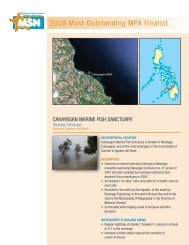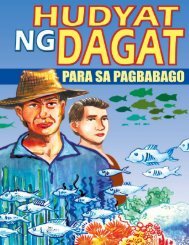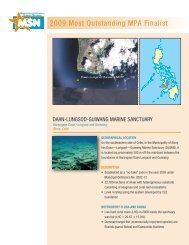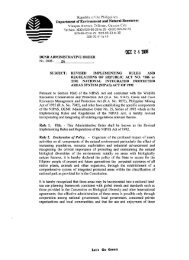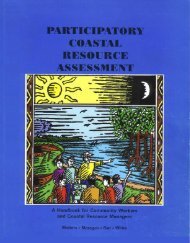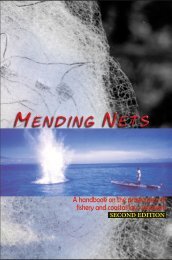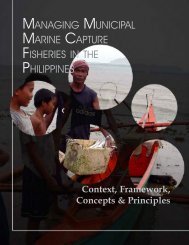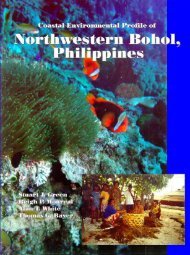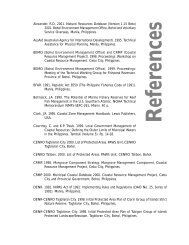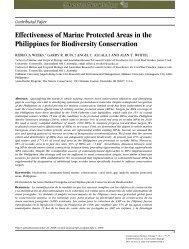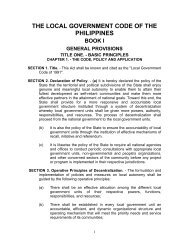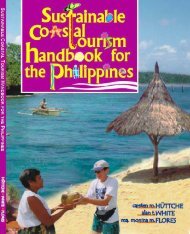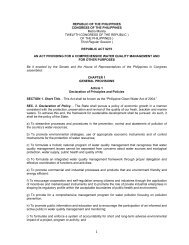Part 2 - Oneocean.org
Part 2 - Oneocean.org
Part 2 - Oneocean.org
- No tags were found...
Create successful ePaper yourself
Turn your PDF publications into a flip-book with our unique Google optimized e-Paper software.
CRMP TRAINING COURSES FOR COASTAL MANAGEMENTCRMP has successfully implemented several training courses in collaboration with the Department of Environment andNatural Resources, Department of Agriculture - Bureau of Fisheries and Aquatic Resources, other government agenciesand non-governmental <strong>org</strong>anizations. These include:w Integrated Coastal Managementw <strong>Part</strong>icipatory Coastal Resource Assessmentw Local Coastal Law Enforcementw Mangrove Managementw Strategic Planning for Coastal Managementw Coastal Tourism Planning and Managementw Seaweed Grower’s TrainingIntegrated Coastal Management Training Course. This ten-day course is designed to meet the training requirements forindividuals from national and local government, NGOs, and academic institutions who will be working in, and practicing,coastal resource management. The course is based on past experiences, but evolves to incorporate new coastal managementpractices and tools.The course is primarily meant for use in local training efforts in the Philippines, and can help to standardize integratedcoastal management trainings by making the training functions of local institutions more routine. The implementation ofthis course always strives to improve quality, add value and enhance knowledge about the practice of coastal managementin the Philippines.Integrated Coastal Management Short-term Training Course. This three-day course consists of ten sessions covering awide range of inter-related topics such as: coastal ecosystem, concept of ICM, coastal management options and strategicplanning. The course aims to enhance the participants’ awareness of coastal environmental issues and appreciate theintegrated coastal management approach to address these challenges.Training Objectives:w Introduce the participants to the economic, social and biological importance of coastal resourcesw Describe the existing institutional system of coastal resource management in the Philippinesw Describe the role of leaders and public participation in coastal managementw Explain the importance of integrated coastal management for the Philippines in general, and for the participants’area in particularw Describe the strategic planning process and its relevance to coastal managementw Design appropriate local institutional networks to implement coastal management plans<strong>Part</strong>icipatory Coastal Resource Management. This three-day course was developed to assist the integration of localcoastal resource user knowledge with the understanding of scientists and planners for effective integrated coastal resourcemanagement. Much of the of the content is based on project work and research conducted in the Philippines and othercountries in geography, human ecology and various coastal resource management efforts.The course is designed primarily for used by municipal-level trainers involved in community development forsustainable coastal resource use. It has two main purposes: first, to assist local resource managers in maximizing thecontribution they can make to initial coastal resource assessment and project monitoring and evaluation; and second, toinitiate dialogue and input from local community resource users in a relevant and meaningful fashion for planningpurposes.The output of this course will enable resource managers to work with local coastal resource users to generate valuableinformation for coastal management planning and implementation. This will be done simultaneously while improvingcommunity participation and local empowerment.Training Objectives:w Illustrate the coastal resource management processw Enumerate the many benefits of a participatory coastal resource assessmentw Identify the various stakeholders in a coastal communityw Show the linkages between and among resources, people and sustainable coastal management and developmentw Apply the various PCRA techniques: (a) interview, (b) transect, ( c) habitat assessmentw Compile a preliminary coastal area profile based on PCRA resultsw Develop a PCRA map of the local coastal management areaLocal Coastal Law Enforcement. This one-day course, which was developed by Silliman University’s LegalEnvironmental Assistance Program, seeks to develop the community-based enforcement of coastal laws. It encourages theparticipation of the community in the enforcement process where such participation is sanctioned by law. To this end,trainers, coastal managers and enforcers should be equipped with a basic knowledge and understanding of the law.Training Objectives:w Make “instant lawyers” out of trainers from the LGUs, NGOs and POs involved in <strong>org</strong>anizing coastalcommunities for effective coastal resource managementw Present fisheries and aquatic resource laws to lay persons and non-lawyers in a manner that is immediatelyunderstandable73


